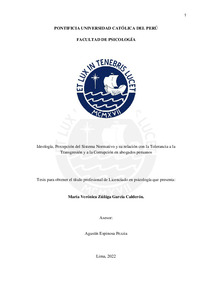| dc.contributor.advisor | Espinosa Pezzia, Agustín | |
| dc.contributor.author | Zúñiga García Calderón, María Verónica | |
| dc.date.accessioned | 2022-08-10T22:40:59Z | |
| dc.date.available | 2022-08-10T22:40:59Z | |
| dc.date.created | 2022 | |
| dc.date.issued | 2022-08-10 | |
| dc.identifier.uri | http://hdl.handle.net/20.500.12404/23042 | |
| dc.description.abstract | La presente investigación tuvo como objetivo estudiar la relación entre la SDO, Laxitud Moral
Política, Percepción del Sistema Normativo, Confianza en las Instituciones, Tolerancia a la
Transgresión Normativa y Tolerancia a la Corrupción en abogados peruanos. Se evaluó a 105
abogados, 62 hombres (59%) y 43 mujeres (41%), entre los 25 y 62 años (M = 33.54, DE=6.59).
Los resultados muestran una relación significativa y directa entre Laxitud Moral Política con
SDO, con Tolerancia a la Transgresión Normativa y con Corrupción como un mal menor. La
dimensión de Percepción de falta de legitimidad se relacionó con la dimensión de Corrupción
como un fenómeno normalizado y con Corrupción como un fenómeno necesario. Tolerancia a
la Corrupción correlacionó directamente con Tolerancia a la Transgresión Normativa. Se
encontraron relaciones significativas e inversas entre Percepción de Falta de Legitimidad,
Percepción de Transgresión y Percepción de Debilidad Normativa y algunas dimensiones de
Tolerancia a la corrupción con Confianza en ciertas instituciones. Por último, se encontraron
tres modelos de regresiones. El primer modelo de regresión estableció que la variable de
Laxitud Moral Política explica en un 15.2% la Tolerancia hacia el uso de dinero en beneficio
propio/soborno. El segundo modelo de regresión estableció que la dimensión de Percepción
de Debilidad Normativa explica en un 13% la Corrupción como un fenómeno normalizado. El
ultimo modelo de regresión estableció que la tolerancia a la corrupción es explicada en un
40% por la tolerancia a la transgresión normativa. | es_ES |
| dc.description.abstract | The aim of this research was to study the relationship between SDO, Political Moral Laxity,
Perception of the Regulatory System, Trust in Institutions, Tolerance to Regulatory
Transgression and Tolerance to Corruption in Peruvian lawyers. A total of 105 lawyers were
evaluated, 62 men (59%) and 43 women (41%), between 25 and 62 years of age (M=33.54,
SD=6.59). The results show a significant and direct relationship was found between Political
Moral Laxity with SDO, with Tolerance to Normative Transgression and with Corruption as a
lesser evil. The dimension of Perception of Lack of Legitimacy was related to the dimension
of Corruption as a Normalized Phenomenon and to Corruption as a Necessary Phenomenon.
Tolerance to Corruption correlated directly with Tolerance to Normative Transgression.
Significant inverse relationships were found between Perception of Lack of Legitimacy,
Perception of Transgression and Perception of Normative Weakness and some dimensions of
Tolerance to Corruption with Trust in certain institutions. Finally, three regression models were
found. The first regression model established that the Political Moral Laxity variable explains
15.2% of the Tolerance to the use of money for personal benefit/bribery. The second regression
model established that the Normative Weakness Perception dimension explains 13% of
Corruption as a normalized phenomenon. The last regression model established that tolerance
to corruption is explained by 40% by tolerance to normative transgression. | es_ES |
| dc.language.iso | spa | es_ES |
| dc.publisher | Pontificia Universidad Católica del Perú | es_ES |
| dc.rights | info:eu-repo/semantics/openAccess | es_ES |
| dc.rights.uri | http://creativecommons.org/licenses/by-nc/2.5/pe/ | * |
| dc.subject | Administración pública--Prácticas corruptas--Perú | es_ES |
| dc.subject | Corrupción--Perú | es_ES |
| dc.subject | Abogados--Ética profesional | es_ES |
| dc.subject | Abogados--Encuestas | es_ES |
| dc.title | Ideología, Percepción del Sistema Normativo y su relación con la Tolerancia a la Transgresión y a la Corrupción en abogados peruanos | es_ES |
| dc.type | info:eu-repo/semantics/bachelorThesis | es_ES |
| thesis.degree.name | Licenciado en Psicología | es_ES |
| thesis.degree.level | Título Profesional | es_ES |
| thesis.degree.grantor | Pontificia Universidad Católica del Perú. Facultad de Psicología | es_ES |
| thesis.degree.discipline | Psicología | es_ES |
| renati.advisor.dni | 10300382 | |
| renati.advisor.orcid | https://orcid.org/0000-0002-2275-5792 | es_ES |
| renati.author.dni | 71207178 | |
| renati.discipline | 313016 | es_ES |
| renati.juror | Janos Uribe, Erika | es_ES |
| renati.juror | Fourment Sifuentes, katherine Gretel | es_ES |
| renati.level | https://purl.org/pe-repo/renati/level#tituloProfesional | es_ES |
| renati.type | https://purl.org/pe-repo/renati/type#tesis | es_ES |
| dc.publisher.country | PE | es_ES |
| dc.subject.ocde | https://purl.org/pe-repo/ocde/ford#5.01.00 | es_ES |






